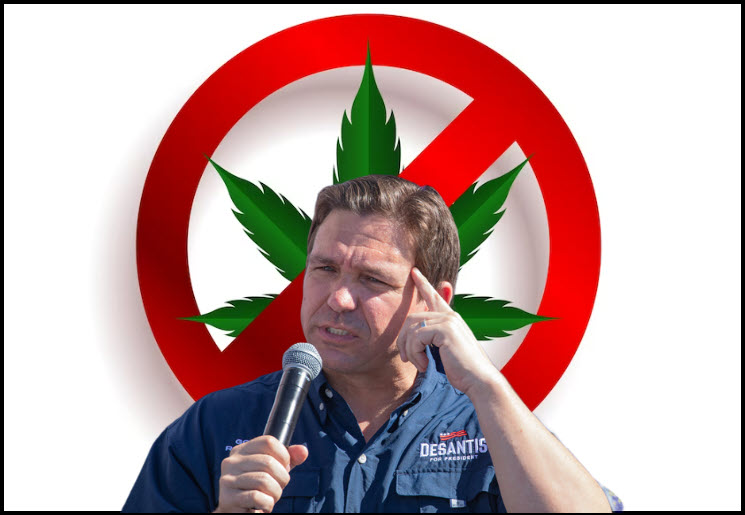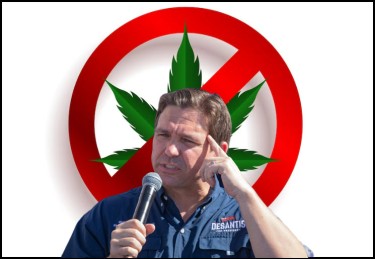Cannabis News
Why Does Presidential Candidate Ron DeSantis Hate Weed So Much?
Published
2 years agoon
By
admin

During a presidential campaign event in Iowa on Saturday, Ron DeSantis reaffirmed his stance against the legalisation of marijuana. He expressed worries about the potential for young children to access cannabis contaminated with fentanyl.
DeSantis underscored that he sees this issue as a pressing modern concern, differing greatly from substances used decades ago. He thinks that such substances’ usage among the youth leads to a myriad of problems. Additionally, he highlighted the severe toll drugs are taking on the nation.
The event, orchestrated by the Never Back Down Super PAC, offered DeSantis an opportunity to illustrate his viewpoint. He cited San Francisco as a case study for why marijuana should remain illegal. Nevertheless, he did concede that Florida has permitted medical marijuana for a substantial duration without encountering problems linked to fentanyl contamination.
Community Responses and Reactions: A Divided Reception to DeSantis’ Presence
The attendance of Governor Ron DeSantis at the prayer vigil triggered a mix of sentiments within the community. Councilwoman Ju’Coby Pittman’s call for increased state funding and her assertion that the tragedy stemmed from prejudice resonated deeply. This struck a chord with those who believed the incident shed light on long-standing neglect and disparities in resource distribution.
The contrasting reactions to DeSantis’ presence reflected the community’s divisions. Some viewed his attendance as a chance for him to grasp the situation firsthand, while others booed to express their dissatisfaction with his policies. His speech, focusing on security enhancements and support initiatives, attempted to address concerns raised by Pittman. However, the interruption underscored the challenge of navigating sensitive issues in a community grappling with immediate grief and underlying tensions. The incident highlighted the complexities of leadership during a crisis and emphasised the necessity for open dialogue and empathetic action.
Shooting In Jacksonville: DeSantis Booed At Prayer Vigil
Amid a prayer vigil held for the victims of a tragic mass shooting at a Jacksonville Dollar General store, there was a notable incident involving Florida Governor Ron DeSantis. As he approached the podium to address the gathering, he was met with boos from the audience.
This solemn vigil marked the second of its kind on that Sunday, at 2161 Kings Road, adjacent to the Dollar General establishment where the tragic shooting unfolded.
Before the governor’s speech, Councilwoman Ju’Coby Pittman, who represents District 10 in Jacksonville, condemned the violence and urged for improved state funding.
“This day is dedicated to standing by the side of the residents who have endured an undeserved tragedy,” Pittman stated, referencing the three Black victims who lost their lives in the Dollar General store shooting executed by a 21-year-old white assailant in Northwest Jacksonville on the previous Saturday.
Pittman highlighted that the victims were all individuals of Black ethnicity. She also pointed out that the area where the shooting occurred, namely District 10, has been neglected in terms of receiving adequate state funding.
“Let’s be candid, the funding we truly deserve often eludes us,” Pittman asserted. “However, when I make my funding request this week… rest assured, we will obtain it.”
Directing her attention towards the community leaders present, including Sheriff T.K. Waters, who attributed Saturday’s incident to racial motivations, Pittman praised their efforts in confronting the truth head-on.
“I commend your actions from yesterday. Because you did not shy away from addressing the situation for what it is. We cannot allow ourselves to remain in denial. We cannot permit an individual from another county to infiltrate our community and inflict harm,” Pittman declared.
She forcefully conveyed, “This is not a matter of intra-community conflict. It’s an act of prejudice.” Her words resonated powerfully with the crowd.
Pittman shifted her focus to Florida Governor Ron DeSantis, who was present among the attendees.
“Governor, I am aware of your presence here, and truth be told, I am glad that you are here to witness firsthand the people and the profound impact this community has experienced. To create genuine change, one must intimately understand the situation,” Pittman addressed the governor.
Subsequently, DeSantis was summoned to the podium, greeted by a mix of scattered applause and jeers from the crowd.
He initiated his speech by recognising Councilwoman Pittman’s call for increased state funding, though his words were cut off in mid-sentence.
“Councilwoman, I understand your concerns, rest assured. We’ve already been actively exploring avenues to allocate resources for enhancing security at Edward Waters College. We will not permit these esteemed institutions to fall prey to individuals who…”
Councilwoman Pittman briefly seized the microphone from the podium, aimed at quelling the dissenting voices in the audience, particularly those not enthused about DeSantis’ presence.
“Today isn’t about political affiliations. Bullets pay no heed to party lines,” Pittman’s voice boomed.
“If the governor has come here bearing contributions for my community, you better believe I’m accepting them because we’ve endured more than enough already.”
Pittman then called for a hush among the crowd and returned the microphone to the governor.
“Tomorrow morning, we’re set to unveil initiatives that I believe will provide assistance, not only in fortifying security but also in endeavours to support these affected families,” Governor DeSantis announced.
He shifted his focus towards the assailant, branding him a “flagrant wrongdoer of the highest order.”
“The actions he undertook are wholly intolerable within the confines of Florida. We will not permit individuals to be singled out based on their ethnicity. We shall rise, and we shall undertake the necessary measures to ensure that malevolence does not triumph within our state’s borders,” DeSantis proclaimed.
Governor DeSantis revealed an ongoing collaboration with Edward Waters University to meet the institution’s needs. He affirmed that no one shall “target historically Black colleges or universities within Florida’s jurisdiction and evade consequences.”
HBCU, which signifies historically Black college or university, was clarified by DeSantis.
Concluding his address, DeSantis conveyed unity with the community, assuring that “Florida stands in solidarity with this community. Assistance is en route.”
Bottom Line
Governor Ron DeSantis’ reaffirmation of his stance against marijuana legalization and subsequent presence at a prayer vigil for the victims of a tragic shooting in Jacksonville exposed a community grappling with division and diverse viewpoints. While DeSantis’ speech aimed to address concerns and emphasize unity, the mixed reception highlighted the intricate challenges of leadership during times of crisis. The incident underscored the urgent need for open dialogue, empathetic understanding, and concerted efforts to bridge gaps within the community.
RON DESANTIS ON WEED, READ ON…
RON DESANTIS SAYS NO TO LEGALIZATION, SO WHO CONTROLS HIS WALLET?
You may like
-


Cannabis Can Help A Sore Throat
-


Cannabis and the Authoritarian State
-


As cannabis consumer tastes evolve, industry must look beyond potency
-


Article: Early 2025 Empire State Psychedelic Policy Roundup
-


White House Finally Comments On Marijuana Industry
-


Stop Using Bat Poop to Fertilize Your Weed Plants Immediately, Here is Why…


Cannabis and the Authoritarian State
Cannabis has been legal for longer than it has been illegal. Let that sink in for a minute. For thousands of years, humans cultivated and consumed cannabis freely across civilizations and continents. It wasn’t until the early 1900s that we witnessed a massive push to drive hemp and cannabis into the black market, primarily due to industrial competition from petrochemicals, pharmaceuticals, and other industrial applications.
What makes cannabis so threatening to powerful interests? For starters, hemp and cannabis are highly versatile crops with over 50,000 different uses, from medicine to textiles to fuel. Even more remarkable is how this plant is hardwired to work with the human body through our endocannabinoid system—a biological network we didn’t even discover until the 1990s.
Perhaps most threatening of all is that cannabis is insanely easy to grow. This means that if the plant helps you with a particular physical ailment, you have the ability to grow your own medicine indefinitely. No insurance premiums, no wait lists, no pharmaceutical middlemen—just you cultivating your own healing directly from the earth.
Authoritarians do not like this, not one bit. When people can meet their own needs independently, power structures lose their grip. When citizens can think differently without permission, control systems begin to fail. So today, we’re going to look at the interesting relationship between authoritarianism and cannabis, and how this humble plant plays a key role in keeping you free.
We’ve already established the versatility of cannabis, but there’s another element that those old D.A.R.E. PSAs inadvertently reveal about what authoritarians think about cannabis. I’m talking, of course, about “behavior.” You see, in an authoritarian system, you and I are but cogs in the machine. We’re the expendables who should be proud to work ourselves to death for our “fearless leaders.”
This is precisely why certain ideas, philosophies, religions, movements, books, and substances are typically banned in authoritarian regimes. Take North Korea as an example: everything from the type of television citizens watch to the music they hear is a tightly spun spell designed to keep the populace in check. While they don’t have explicit laws against hemp (they actually grow it industrially), smoking psychoactive cannabis is strictly forbidden.
Contrast this with places like Malaysia, where you can get up to 5 years for possessing just 20 grams of cannabis, and even face the death penalty depending on the situation. These authoritarians don’t play around when it comes to cannabis because they know it affects the behavior of their populace in ways they can’t control.
The question becomes: what behavior do they fear so much that cannabis produces within the individual?
The answer is a critical mind. People who consume cannabis often begin to question their own belief systems. Most regular users undergo some transformation in their values and perspectives. Cannabis has a unique way of helping people see beyond cultural programming and think outside established paradigms. It can make the familiar strange and the strange familiar—a psychological state that’s antithetical to authoritarian control.
This independent thinking runs counter to the narrative of authoritarians who wish to maintain a tight grip on social consciousness. If even 10% of a population begins to pivot in their behavior within a regime, it can have massive ripple effects. Just look at cannabis in the US—it went from being demonized to being embraced by the majority in less than 80 years, despite massive propaganda efforts.
For authoritarians, psychoactive cannabis isn’t primarily a threat to public health and wellbeing—it’s a threat to the health and wellbeing of authoritarianism itself. When people start thinking differently, they start living differently. When they start living differently, they start demanding different. And that’s the beginning of the end for any system built on unquestioning obedience.
Beyond the threat to thought control, there’s another reason why drugs in general remain illegal: the state can use prohibition as a weapon against the populace. This isn’t conspiracy theory—it’s documented history.
Take Nixon’s war on drugs. His domestic policy chief, John Ehrlichman, later admitted: “We knew we couldn’t make it illegal to be either against the war or black, but by getting the public to associate the hippies with marijuana and blacks with heroin, and then criminalizing both heavily, we could disrupt those communities.” Nixon essentially placed cannabis on the Controlled Substances Act because he needed an excuse to shut down anti-war protests and target Black communities.
Since hippies and anti-war protesters were smoking “freedom grass,” making it illegal would circumvent their freedom of speech and freedom of assembly, and more importantly—turn free citizens into state property. It’s a win-win if you’re an authoritarian looking to silence dissent.
Then there’s the whole “boogeyman” complex that prohibition creates. We’re told “drug dealers” are roaming the streets preying on innocents, giving them “marihuanas” so they can do vile things. What the government conveniently leaves out is how the banks these “dealers” use to launder their money remain untouched. They don’t mention the shadier dealings of law enforcement either—like running guns into Mexico (eventually leading to the death of one of their own), or spraying poison on crops, killing and hospitalizing people because, you know…”Drugs are bad!”
Authoritarians cannot let go of the value that keeping the most widely used illicit substance in the world illegal provides them. This explains why the US hasn’t federally legalized cannabis despite nearly 80% of Americans supporting some form of legalization. It’s not because they don’t have enough research or that they’re genuinely concerned about public health—it’s because prohibition gives them all the privileges of violating constitutional rights while siphoning money into their coffers.
Drug prohibition creates a perpetual enemy that can never be defeated, allowing endless justification for surveillance, militarized police, asset forfeiture, and expansion of state power. What authoritarian could resist such a convenient tool?
Cannabis is a plant. You can’t make nature illegal—it’s counter to the human experience. When governments attempt to criminalize a naturally occurring organism that humans have cultivated and used for thousands of years, they reveal the absurdity of their position and the limits of their authority.
While the United States isn’t a full-on authoritarian state (yet), the truth is that many authoritarian elements have played out over the years. You only need to look as far as the war on drugs to see how the state utilizes prohibition as a weapon to their advantage. From no-knock raids to civil asset forfeiture to mass incarceration, drug laws have erected a parallel legal system where constitutional protections often don’t apply.
The fundamental truth is that cannabis is not only versatile and medicinal, it gives you back your autonomy in multiple ways. It helps you think for yourself. It allows you to grow your own medicine. It connects you with a plant that humans have used ceremonially, medicinally, and industrially throughout our history. And this autonomy is something authoritarians cannot stand—free individuals who know how to think beyond the narratives they’re fed.
Cannabis doesn’t just get you high—it offers a perspective from which the absurdities of prohibition become glaringly obvious. Perhaps this is why, as state after state legalizes, we’re witnessing the slow but steady unraveling of one of the most enduring authoritarian policies in American history.
So if you count yourself among those who value freedom of thought and bodily autonomy, who believe that nature doesn’t require government permission, and who understand that true liberty includes the right to explore your own consciousness—well, maybe it’s time to toke one up for freedom!
LEGALIZING CANNABIS IS NOT ENOUGH, READ ON..
Cannabis News
Stop Using Bat Poop to Fertilize Your Weed Plants Immediately, Here is Why…
Published
1 day agoon
April 1, 2025By
admin

Don’t Fertilize Your Weed with Bat Poop
Fertilization is a critical step for growing healthy marijuana plants.
They help provide essential nutrients for marijuana in various stages of growth, while promoting plant growth. There are dozens of different fertilizers to choose from in the market; growers can choose based on budget, nutrients needed, location, season, and much more. But not all fertilizers are made equally – of course, some are of better quality than others.
That said, there are some rather unusual fertilizers that can be used on plants. These may include, but are not limited to: coffee, milk, grass clippings, banana peels, fish tank water, potato water, and even urine! Yes, it does sound strange, but to gardening enthusiasts, there is nutritional value to be found in each of these things, which can make them suitable fertilizers depending on the circumstances.
For example, grass clippings make excellent mulch and can provide potassium, nitrogen, and phosphorus. Urine is a potent source of nitrogen as well as phosphorus. Banana peels are rich in calcium, which is excellent for promoting root growth while helping supply oxygen to the soil.
But what about bat poop? Also known as guano, bat poop has been said to work as a plant fertilizer because it’s rich in nitrogen, potassium, phosphorus, and other nutrients. Unfortunately, using bat poop as a plant fertilizer can also be dangerous. So if you don’t really know what you are doing, bat poop as a fertilizer can be extremely risky.
Bat Poop Fertilizer Kills 2 NY Men
On December 2024, news of two men hailing from Rochester, New York, dying went viral.
The cause of death was dangerous fungus, in the bat poop that they were using to fertilize their marijuana plants. Both men grew their own marijuana plants for medical consumption, but unfortunately developed histoplasmosis after breathing toxic fungal spores from the guano.
One of the men was aged 59 years old; he bought bat poop online to use as fertilizer for his plants. Meanwhile, the other was a 64-year-old male who found guano in his attic, then decided to use it to fertilize his cannabis plants. They both developed similar symptoms, including chronic coughs, fever, severe weight loss, and respiratory failure. The case was also discussed in the Open Forum Infectious Diseases medical journal.
Is there a safe way to use bat poop as fertilizer? If you ask me, I truly can’t understand why one would use guano as fertilizer when there are so many other proven safe alternatives out there that are simply not as risky. According to the University of Washington, one must always wear a dust mask each time you open a bag containing soil amendments. That’s because a mask will greatly decrease the chances of breathing in fungal spores, which could be potentially dangerous. They also go on to explain that yes, guano is indeed used as fertilizer for its valuable nitrogen content but it still isn’t without its own risks, particularly of developing Histoplasma – the same condition that killed the two men.
Make Your Own Safe Fertilizers At Home
There are many other safe, affordable – and even free – fertilizers you can feed your marijuana plants with. It doesn’t have to cost a fortune nor does it have to be risky to your health.
Check out these easy, low-cost, DIY fertilizers for weed:
-
Coffee grounds are abundant in nitrogen, which makes it perfect for the vegetative stage of marijuana plants. They are also a fantastic source of organic materials and green waste, which contain other vital nutrients. When the coffee grounds decompose, they create soil aggregates that improve soil aeration and its water retention capabilities.
Mix around 2 grams of coffee ground for every liter of soil. Measuring its pH levels is also helpful, since you want it to be between 6 to 6.5
-
Crushed eggshells are a great way to ensure no eggshells go to waste. It’s rich in calcium plus other minerals that are effective in improving overall plant structure, health, and growth. In fact, so many gardeners and farmers commonly use crushed eggshells to help boost plant growth – and it will work just as well for marijuana plants.
They’re really easy to use, too! Just mix eggshells into the soil, or steep them into water then pour into the soil for a calcium-packed feed.
-
Banana tea or water is rich in potassium and magnesium, making it perfect as a feed during the marijuana plant’s flowering stage. You can use banana peels differently: with 3 to 5 banana peels, soak it in water for 2 days. Then you can use the water on your plants, and even leave the banana peels as compost for your garden.
-
Wood ash from your fireplace or other sources is a great source of phosphorus and potassium. Simply sprinkle some wood ash over marijuana during the final flower phase. Just use 1 or 2 grams of ash for every liter of substrate. Be careful not to use too much wood ash, or it can make the soil too alkaline.
-
Animal manure, such as those from cows, rabbits, or horses, make excellent organic fertilizers. Just be sure that they’re composed properly so that you avoid introducing weed seeds, or pathogens.
These low-cost fertilizers are also natural and effective. There’s no reason for you to turn to bat poop as fertilizer, even if you’re in a bind.
Conclusion
Guano or bat poop is a poor choice of fertilizer if you don’t know what you are doing. It’s risky and potentially dangerous – just not worth it. Instead, fertilize your marijuana plants with these options mentioned.
BEST POOP FOR CANNABIS PLANTS, KEEP READING…
Cannabis News
Getting THC Edibles in Your Edible Arrangement?
Published
3 days agoon
March 30, 2025By
admin

Edible Arrangements Leans into Intoxicating Hemp Products: A Strategic Expansion
Edible Arrangements, a brand renowned for its vibrant fruit bouquets and sweet treats, is embarking on a bold new venture into the hemp and THC-infused edibles market. Through its parent company, Edible Brands, the company has launched Edibles.com, an e-commerce platform offering a variety of hemp-based products such as THC-infused beverages, gummies, and snacks. This strategic move taps into the burgeoning demand for cannabis-related wellness products and reflects a deliberate expansion beyond traditional offerings.
Introduction to Edible Arrangements and Its New Venture
Edible Arrangements was founded in 1999 by Tariq Farid, who envisioned a unique way to gift fresh fruit arrangements that were both visually appealing and delicious. Over the years, the company has grown to become a global brand with hundreds of locations across the United States and internationally. However, the company’s latest initiative marks a significant departure from its traditional fruit-based offerings, signaling a broader strategic shift towards becoming a comprehensive food, health, and wellness company.
The New Venture: Edibles.com
Edibles.com debuted on March 20, 2025, starting operations in Texas with ambitious plans to expand rapidly across Southeastern states like Florida and Georgia. The platform is designed to cater to consumers aged 21 and older, providing low-dose THC products that comply with the 2018 Farm Bill, which legalized hemp containing less than 0.3% THC by dry weight. Select products will also be available for nationwide shipping where legally permitted, leveraging the company’s existing logistics infrastructure.
Product Lineup
The initial product lineup includes a range of THC-infused beverages, gummies, and snacks. These products are designed to appeal to both seasoned cannabis users and newcomers looking for low-dose, accessible options. The company emphasizes the importance of quality and safety, ensuring that all products undergo rigorous testing to meet high standards of purity and potency.
Strategic Alignment and Market Potential
The move into the infused edibles market aligns with Edible Brands’ vision of becoming a broader food, health, and wellness company. CEO Somia Farid Silber highlighted that the infused edibles market is a fast-growing sector with high consumer demand for safe and reliable products. The company is leveraging its extensive franchise network to deliver these items while planning to open brick-and-mortar stores under the Incredible Edibles brand.
Market Trends and Consumer Demand
The cannabis industry, particularly the segment focused on hemp and THC-infused products, has seen exponential growth in recent years. This growth is driven by increasing consumer interest in wellness and recreational products, as well as evolving legal landscapes that have opened up new markets. Edible Arrangements is positioning itself to capitalize on this trend by offering products that cater to both health-conscious consumers and those seeking unique gifting options.
Challenges and Opportunities
While this expansion offers significant growth potential, it also comes with challenges such as navigating varying state regulations and ensuring product safety and quality. The company aims to address these issues through robust infrastructure and consumer advocacy. Thomas Winstanley, a cannabis industry veteran leading Edibles.com, emphasized the company’s unique position to drive innovation in this emerging market.
Regulatory Challenges
One of the primary challenges facing Edible Arrangements is the complex regulatory environment surrounding cannabis products. Laws regarding the sale and distribution of THC-infused products vary significantly from state to state, requiring the company to adapt its operations to comply with local regulations. This includes ensuring that products meet specific THC content limits and are marketed responsibly.
Quality Control and Safety
Another critical challenge is maintaining high standards of quality and safety across all products. Edible Arrangements is investing heavily in testing and quality assurance processes to ensure that all products meet stringent safety standards. This includes partnering with reputable suppliers and implementing rigorous testing protocols to verify the potency and purity of all THC-infused items.
Consumer Education and Advocacy
As part of its strategy, Edible Arrangements is also focusing on consumer education and advocacy. The company recognizes that many consumers are new to cannabis products and may have questions about usage, dosage, and safety. To address this, Edibles.com will provide comprehensive product information, dosage guidelines, and resources for consumers to learn more about the benefits and risks associated with THC-infused products.
Marketing Strategy
Edible Arrangements plans to leverage its existing brand recognition and customer loyalty to promote its new line of hemp-based products. The company will utilize social media, email marketing, and targeted advertising to reach its target audience. Additionally, partnerships with influencers and cannabis industry experts will help build credibility and drive awareness about the brand’s entry into this new market.
Future Expansion Plans
In the coming months, Edible Arrangements plans to expand its operations beyond Texas, targeting key markets in the Southeast. The company is also exploring opportunities to open physical stores under the Incredible Edibles brand, which will offer a curated selection of THC-infused products alongside traditional Edible Arrangements items.
Incredible Edibles Stores
The Incredible Edibles stores will serve as a unique retail experience, combining the company’s traditional fruit arrangements with its new line of hemp-based products. This format will allow customers to explore and purchase THC-infused items in a welcoming and educational environment. The stores will also host workshops and events focused on cannabis education and wellness, further enhancing the brand’s position as a leader in this emerging market.
Conclusion
Edible Arrangements’ foray into the hemp and THC-infused edibles market marks a significant strategic shift for the company. By leveraging its brand recognition and logistical capabilities, Edible Arrangements is poised to become a major player in this rapidly growing sector. While challenges exist, the company’s commitment to quality, safety, and consumer education positions it well for success in this new venture.
As the cannabis industry continues to evolve, Edible Arrangements’ entry into this market underscores the broader trend of mainstream brands embracing cannabis-related products. This move not only expands the company’s offerings but also reflects a broader cultural shift towards greater acceptance and normalization of cannabis use.
HEMP-DERIVED THC DELIVERIES ARE HERE, READ ON…

Cannabis Can Help A Sore Throat

Cannabis and the Authoritarian State

As cannabis consumer tastes evolve, industry must look beyond potency

Article: Early 2025 Empire State Psychedelic Policy Roundup

White House Finally Comments On Marijuana Industry

Stop Using Bat Poop to Fertilize Your Weed Plants Immediately, Here is Why…

The History Behind April Fool’s Day

Star signs and cannabis strains: April 2025 horoscopes

Does Comfort Food Actually Help

Connect to cannabis history with three legacy strains from Paradise Seeds

Distressed Cannabis Business Takeaways – Canna Law Blog™

United States: Alex Malyshev And Melinda Fellner Discuss The Intersection Of Tax And Cannabis In New Video Series – Part VI: Licensing (Video)

What you Need to Know

Drug Testing for Marijuana – The Joint Blog

NCIA Write About Their Equity Scholarship Program

It has been a wild news week – here’s how CBD and weed can help you relax

Cannabis, alcohol firm SNDL loses CA$372.4 million in 2022

A new April 20 cannabis contest includes a $40,000 purse

Your Go-To Source for Cannabis Logos and Designs

UArizona launches online cannabis compliance online course
Trending
-

 Cannabis News2 years ago
Cannabis News2 years agoDistressed Cannabis Business Takeaways – Canna Law Blog™
-

 One-Hit Wonders2 years ago
One-Hit Wonders2 years agoUnited States: Alex Malyshev And Melinda Fellner Discuss The Intersection Of Tax And Cannabis In New Video Series – Part VI: Licensing (Video)
-

 Cannabis 1012 years ago
Cannabis 1012 years agoWhat you Need to Know
-

 drug testing1 year ago
drug testing1 year agoDrug Testing for Marijuana – The Joint Blog
-

 Education2 years ago
Education2 years agoNCIA Write About Their Equity Scholarship Program
-

 Cannabis2 years ago
Cannabis2 years agoIt has been a wild news week – here’s how CBD and weed can help you relax
-

 Marijuana Business Daily2 years ago
Marijuana Business Daily2 years agoCannabis, alcohol firm SNDL loses CA$372.4 million in 2022
-

 California2 years ago
California2 years agoA new April 20 cannabis contest includes a $40,000 purse







